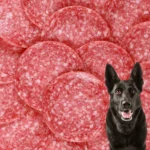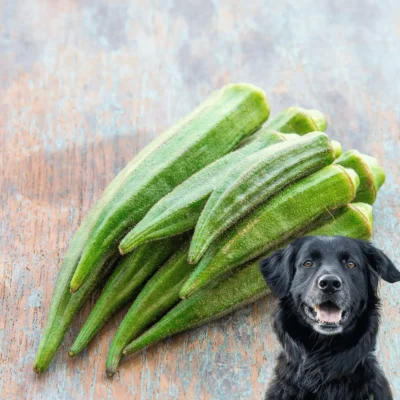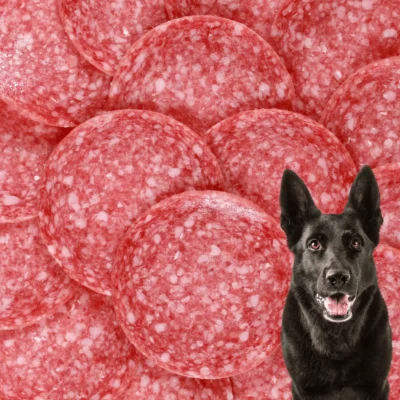While dogs are primarily meat-eaters, they aren’t strictly carnivores. They can enjoy a variety of human foods, from veggies and fruits to grains. Have you ever wondered if your pup can relish the goodness of mung beans, a staple in Asian cuisine? Well, here’s the good news! These petite green legumes aren’t just popular; they’re packed with fiber, vitamins, minerals, and digestive enzymes, making them a fantastic addition to your furry friend’s diet.
In this article, we’ll delve into whether dogs can eat mung beans. We’ll uncover the nutritional value of these legumes, explore potential benefits, and highlight any associated risks for dogs. Additionally, we’ll provide some practical tips to ensure the optimal health of your beloved furry friends.
Here are the topics we’re going to discuss in this blog post:
- What are mung beans?
- Can dogs safely eat mung beans?
- Nutritional value of mung beans
- Health benefits of mung beans for dogs
- Potential risks of feeding mung beans to dogs
- Can dogs eat sprouted mung beans?
- Can dogs eat cooked mung beans?
- How much mung beans should a dog eat?
- Some Tips for safely sharing monggo beans with your pup
What are Mung Beans?

Mung beans, scientifically known as Vigna radiata, belong to the Fabaceae family and are small, green legumes native to the Indian subcontinent and widely cultivated in Asia. Recognized for their sprouted form, bean sprouts, and mung beans are versatile and find use in both sweet and savory dishes.
These beans are commonly sprouted for use in salads, sandwiches, and stir-fries. In certain Asian cuisines, mung beans even make their way into desserts and snacks.
Nutritionally, they are a rich source of protein, fiber, and various vitamins (such as folate, vitamin B6, and vitamin C), as well as minerals like iron, magnesium, and potassium. Notably low in calories and fat, mung beans present a wholesome and versatile option for culinary exploration or as a treat for your canine companion.
Can Dogs Safely Eat Mung Beans?
Dogs can safely enjoy both sprouted (raw) and cooked mung beans. These legumes offer a nutritional boost that can contribute positively to your furry companion’s health. However, to ensure their well-being, it’s crucial to prepare and serve mung beans properly, minimizing the risk of potential digestive issues or other health concerns.
While dogs can consume mung beans in moderate quantities, it’s important to be cautious due to the presence of lectins and phytates. These compounds may pose challenges for dogs in terms of digestion, potentially leading to a leaky gut.
Additionally, golden grams are high in fiber, and excessive consumption can lead to bloating and stomach issues in dogs, such as diarrhea. As with any new addition to your dog’s diet, it’s advisable to introduce mung beans gradually and monitor their response. If you notice any adverse reactions, it’s recommended to consult with your veterinarian for personalized guidance based on your dog’s specific health needs.
Nutritional Value of Mung Beans:
Monggo beans can provide some nutritional benefits for dogs when included in their diet in moderation. Here’s a general overview of the nutritional value of mung beans for dogs:
Per 100 grams of cooked mung beans:
- Calories: Approximately 105 kcal
- Protein: About 7.02 grams
- Carbohydrates: Around 19.15 grams
- Dietary Fiber: About 7.6 grams
- Sugars: Approximately 6.6 grams
- Fat: About 0.38 grams
- Saturated Fat: Approximately 0.094 grams
- Monounsaturated Fat: Around 0.048 grams
- Polyunsaturated Fat: Approximately 0.166 grams
- Vitamins and Minerals:
- Folate (B9): About 162 mcg
- Vitamin B1 (Thiamine): Around 0.244 mg
- Vitamin B2 (Riboflavin): Approximately 0.062 mg
- Vitamin B3 (Niacin): About 0.577 mg
- Vitamin B5 (Pantothenic Acid): Around 0.335 mg
- Vitamin B6: Approximately 0.067 mg
- Calcium: About 27 mg
- Iron: Approximately 1.4 mg
- Magnesium: Around 48 mg
- Phosphorus: About 54 mg
- Potassium: Approximately 149 mg
- Zinc: Around 0.42 mg
- Copper: Approximately 0.067 mg
- Manganese: About 0.235 mg
- Selenium: Around 2.5 mcg
Health Benefits of Mung Beans for Dogs:

Mung beans can offer various health benefits for dogs when included in their diet in moderation. Here are some potential health perks of mung beans for dogs:
Rich in Protein:
Mung beans contain a commendable amount of high-quality plant-based protein. This protein plays a crucial role in the growth, repair, and maintenance of tissues and organs in dogs.
Including such plant-based protein sources can contribute to a well-rounded and balanced diet for your canine companion, supporting their overall health and well-being.
Vitamin:
Mung beans provide various vitamins that can contribute to the overall health and well-being of dogs. Mung beans contain vitamin K, which is important for blood clotting and bone health. Mung beans are a source of vitamin C, which is an antioxidant that supports the immune system, helps with collagen formation, and aids in the absorption of iron.
Mung beans contain various B vitamins that play a crucial role in energy metabolism, red blood cell formation, and overall cellular function. Folate is essential for DNA synthesis and cell division, making it important for the growth and development of tissues.
Minerals:
Mung beans offer several minerals that can be beneficial for dogs. Mung beans are a good source of potassium, an electrolyte that helps regulate fluid balance, muscle contractions, and nerve signals. Magnesium is involved in many biochemical processes in the body, including muscle and nerve function, bone health, and energy production.
Phosphorus is necessary for bone and tooth formation, as well as for various physiological processes. Mung beans contain small amounts of zinc, which is essential for immune function, wound healing, and the maintenance of skin and coat health.
Fiber Content:
The fiber in mung beans, both soluble and insoluble, can help regulate bowel movements and contribute to overall digestive regularity. Adequate fiber intake can prevent constipation and promote healthy stools in dogs. Fiber serves as a prebiotic, promoting the growth of beneficial bacteria in the gut.
The soluble fiber in mung beans can help regulate blood sugar levels by slowing down the absorption of glucose. This can be advantageous for dogs, especially those with diabetes or those at risk of developing insulin resistance.
Low in Fat:
Dogs that need to lose weight or maintain a healthy weight can benefit from foods that are lower in fat. Mung beans can provide a source of nutrition without contributing excessive calories from fats.
Some dogs, especially those with a history of pancreatitis, may require a low-fat diet. Mung beans can be included as part of a balanced diet that helps manage fat intake for these dogs.
Potential Risks of Feeding Mung Beans to Dogs:

While mung beans can offer various nutritional advantages to dogs, it’s important to be aware of potential perils when incorporating them into a dog’s diet. Consider the following factors:
Flatulence and Digestive Upset:
Yes, flatulence (gas) and digestive upset are potential risks associated with feeding mung beans to dogs, as is the case with many legumes. Mung beans, like other legumes, contain oligosaccharides, a type of carbohydrate that can be challenging for some dogs to digest fully.
The undigested oligosaccharides can reach the colon, where bacteria ferment them, leading to the production of gas. This fermentation process can result in flatulence and discomfort for some dogs.
Anti-Nutrient:
Mung beans, like other legumes, contain natural compounds known as anti-nutrients, such as lectins and phytates. Lectins, specialized proteins with a unique ability, gracefully establish connections by binding to carbohydrates. In high amounts, lectins may interfere with nutrient absorption and can potentially cause gastrointestinal irritation.
Phytates are compounds that can bind to minerals like calcium, iron, and zinc, reducing their absorption. While mung beans contain phytates, soaking, sprouting, or cooking can help decrease phytate levels and enhance mineral absorption.
Allergies and Sensitivities:
Some dogs may be allergic to legumes, including mung beans. It’s important to monitor your dog for signs of allergies, such as itching, hives, redness, vomiting, swelling, or gastrointestinal upset when introducing new foods. If you observe any adverse reactions or changes in behavior, consult with your veterinarian promptly.
Protein Quality:
While mung beans contain protein, it’s important to note that plant-based proteins may have lower bioavailability than animal-based proteins. Dogs require high-quality protein for optimal health, and a diet solely reliant on plant proteins may not provide all essential amino acids in the right proportions.
Can Dogs Eat Sprouted Mung Beans?

Dogs can safely enjoy sprouted mung beans, and the sprouting process enhances their nutritional value compared to unsprouted ones. These sprouts are not only softer but also brimming with essential nutrients. Notably, they’re rich in vitamin C, promoting immunity and contributing to healthy skin.
Furthermore, the abundance of vitamin K in sprouted mung beans can aid in speeding up the recovery process. Introducing these sprouts into your dog’s diet can offer a softer and more nutrient-packed addition, supporting their overall health.
Can Dogs Eat Cooked Mung Beans?

Dogs can safely consume cooked mung beans as they are softer and pose a lower risk of choking compared to raw ones. Cooking mung beans helps make them more digestible and reduces the levels of certain anti-nutrients, such as lectins and phytates, that can be found in raw legumes.
Cooking also enhances their digestibility, reducing the likelihood of stomach upset. It’s important, however, to avoid adding salt, onion, or spices to the beans during the cooking process to ensure the dish remains safe for canine consumption.
How Much Mung Beans Should a Dog Eat?
The amount of mung beans a dog should eat depends on various factors, including the dog’s size, age, activity level, overall health, and dietary requirements. While mung beans bring essential vitamins and minerals, dogs need to enjoy them in moderation to avoid tummy troubles. Pet experts suggest keeping mung beans at no more than 10% of your dog’s daily calorie intake.
Mung beans can be included in your dog’s diet a few times per week, but they should not make up the majority of their meals. Despite not being strict carnivores, dogs need top-notch proteins that these beans may not fully provide. It’s crucial to maintain variety in the diet by including other protein sources, vegetables, and carbohydrates.
Monitor your dog’s response to mung beans. If you notice any signs of allergies, sensitivities, or digestive upset, adjust the portion size or consider an alternative.
Helpful Tips for Feeding Dogs with Mung Beans:

Feeding dogs mung beans can be a nutritious addition to their diet when done thoughtfully. Here are some helpful tips:
- Steer clear of canned monggo for your furry friend; they often pack high sodium levels that can be harmful.
- Always cook mung beans thoroughly before feeding them to your dog. Cooking helps make the beans more digestible and reduces the presence of anti-nutrients.
- Prepare mung beans without adding any seasonings, spices, onions, or salt. Dogs don’t require added flavorings, and some seasonings can be dangerous to them.
- Thoroughly wash mung bean sprouts to eliminate any dust, debris, or pesticide traces.
- Before boiling mung beans, ensure you soak them adequately for your dog’s ease of digestion.
- If your dog is new to mung beans, introduce them gradually into their diet to monitor for any digestive upset or adverse reactions.
- Mix cooked mung beans with your dog’s regular food to add variety. However, the primary source of nutrition should still come from a portion of complete and balanced dog food.
Conclusion:
In conclusion, mung beans can be a nutritious addition to your dog’s diet when introduced and managed thoughtfully. These small, green legumes offer a variety of health benefits, including being rich in protein, vitamins, and minerals. Whether served raw as sprouts or cooked, mung beans can contribute to a well-rounded canine nutrition plan.
However, it’s crucial to exercise caution and moderation due to the potential risks associated with mung beans. Factors such as the presence of lectins and phytates and the high fiber content can pose challenges for some dogs, leading to digestive upset.
Cook green grams thoroughly, avoid adding seasonings, and introduce them gradually. While they can enhance your dog’s nutrition, they should only constitute a small part of their overall diet. Monitor your dog’s response and consult your veterinarian for personalized advice, ensuring a balanced and safe canine nutrition plan.
FAQs:
Can dogs eat mung beans?
Yes, dogs can eat mung beans in moderation. Mung beans are a good source of protein, fiber, and various vitamins and minerals.
Are mung beans safe for dogs?
Generally, mung beans are safe for dogs when cooked and served plain. However, avoid adding any seasonings, spices, or oils, as some can be harmful to dogs.
How should mung beans be prepared for dogs?
Cook the mung beans thoroughly before serving them to your dog. Rinse and soak them to remove any anti-nutrients and make them more digestible. Plain-boiled or steamed mung beans are the safest option.
Can dogs eat raw mung beans?
It is not recommended to feed dogs raw mung beans. Raw beans may contain lectins and other substances that can be difficult for dogs to digest. Cooking helps break down these compounds.
Can puppies eat mung beans?
Puppies can eat mung beans in moderation, but it’s crucial to consult with a veterinarian to ensure they receive the right balance of nutrients for their growth and development.
What are the benefits of feeding mung beans to dogs?
Mung beans are a good source of plant-based protein, fiber, and various nutrients. They can be a healthy addition to your dog’s diet, promoting digestive health and providing essential nutrients.












